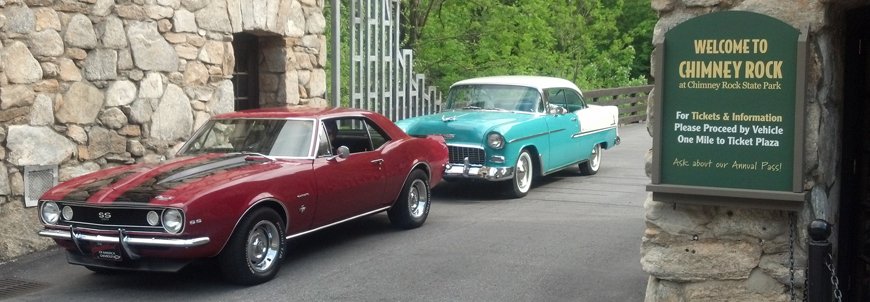Blue Ridge Parkway in Fall

Tips for Getting the Most out of Your Blue Ridge Experience
The Blue Ridge Parkway is visited by millions of tourists each year. Find out why they go -- and what you should know.

Scott Shinn - Founder & CEO
Blacktop Candy’s
American Classic
Auto Tours
322 Village Loop Dr
Apex, NC 27502
866.437.4077 Toll Free
919.439.8733 x301
866.370.2189 Fax
8:30 a.m. - 6:00 p.m. EST
You want stunning autumn beauty? Come on out to the Blue Ridge Parkway, 469 miles of scenic highway
that winds through the Appalachian Mountains in Virginia, Tennessee and North Carolina.
The vivid colors of fall are on full display—a mix of bright yellow, red and orange leaves and
blue skies that draws 17 million visitors annually. While not an official part of the National Park
Service, land on either side is owned by the National Park System, making the Parkway the most visited
stretch of National Park in the country.
With its wide ranging elevation – 650 feet at its lowest and 6,000 feet at its peak—the Blue
Ridge Parkway offers plenty of opportunity to catch nature in all its glory and the changing elevation
is perfect for a one-, two- or three-day road trip.
Some “leaf peepers” take a few hours one day and hope to catch one of those famously
breathtaking views. Often, they leave disappointed. Sometimes, catching the perfect view is a matter
of distance, rather than time.
That’s because the foliage can vary between higher and lower elevations, so it’s a much
better idea to drive for miles, winding your way through the different types of trees, and
experiencing more of the parkway.
What makes the leaves change?
Variations in precipitation, temperature changes and sunlight can vary from spot to spot. Oak,
hickory, flowering tulip and ash – abundant along the parkway – each have a different genetic makeup
and respond differently to environmental factors. The shorter days of autumn combined with cooler
nights add to the intensity of their colors. Too much rain or temperatures that are below freezing,
however, makes for a less intense color change.
Is there anything else to do?
Lots.
The Parkway offers plenty of accommodations and activities. Take in the splendor of the scenery by
day and head back to your cabin or camping spot for night. Make it a romantic getaway for two and stay
at one of the area’s many bed and breakfast inns. Hike, fish or spend a day visiting museums and
galleries along the way.
It’s not known as “America’s Favorite Drive” for nothing. If you’ve
never visited the Blue Ridge Parkway in the fall, why not plan a road trip? It might just become your
favorite drive as well!
Related Post

Chimney Rock Park Goes Classic
Blacktop Candy's Western North Carolina Classic Car Road Trip stops by Chimney Rock State Park on the…